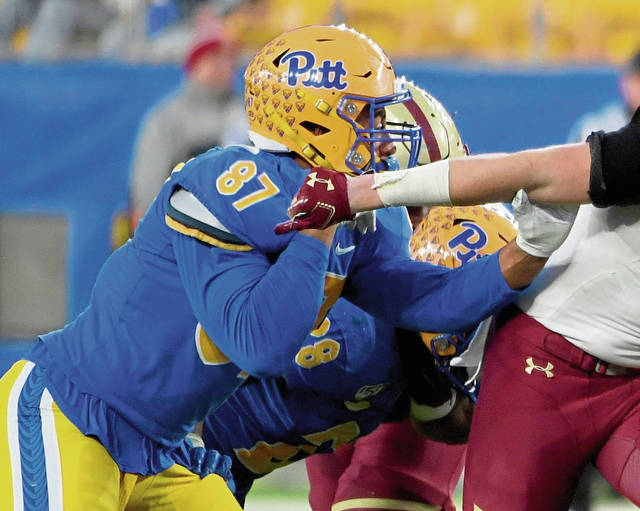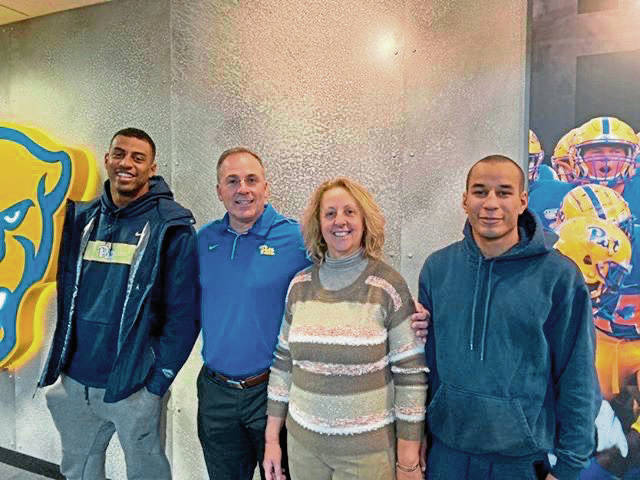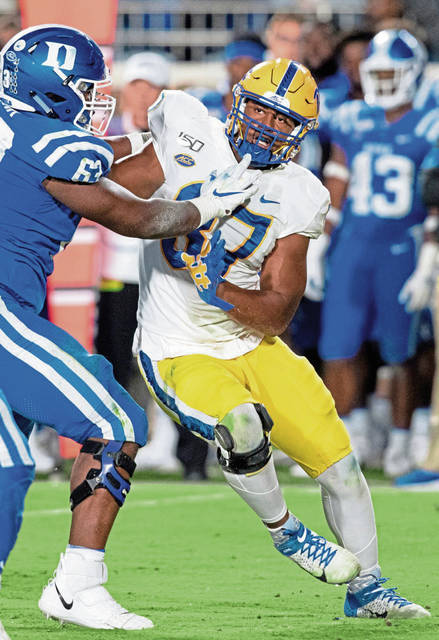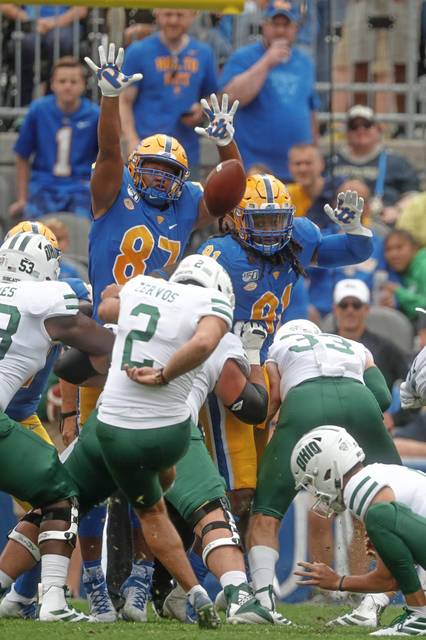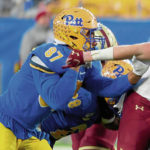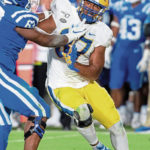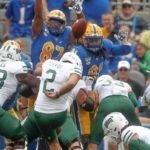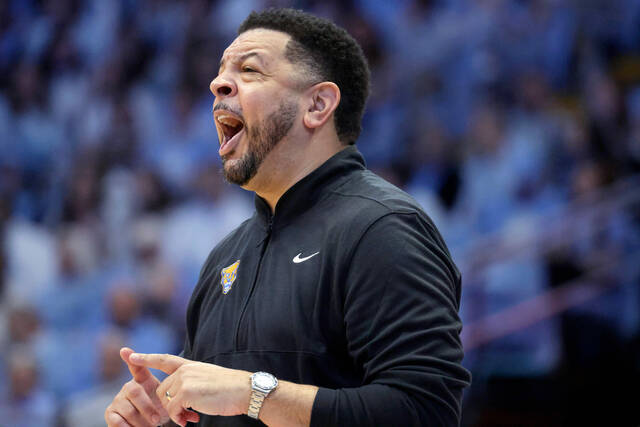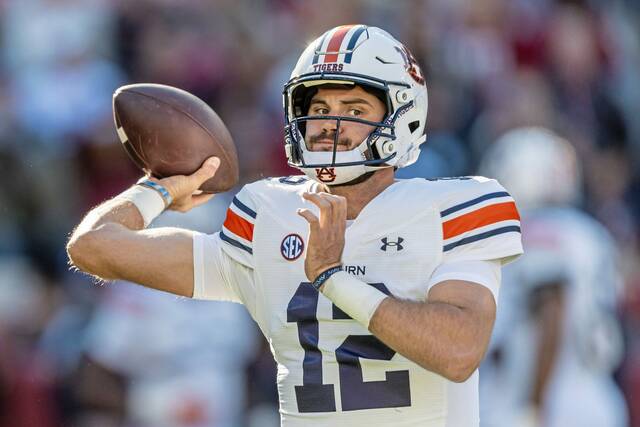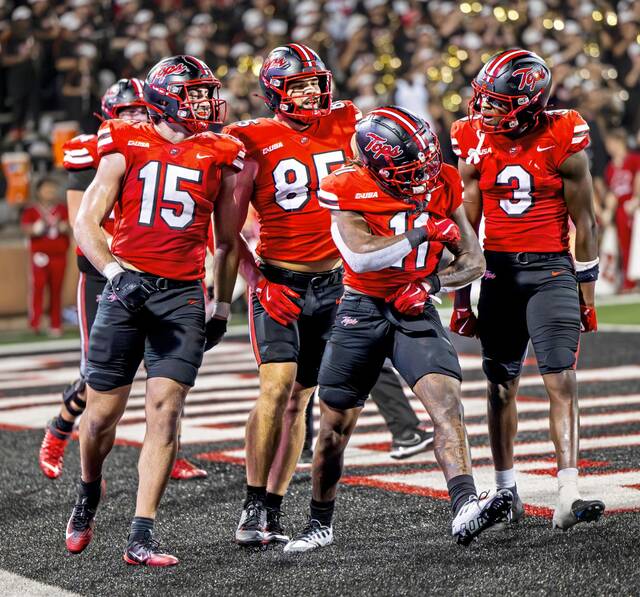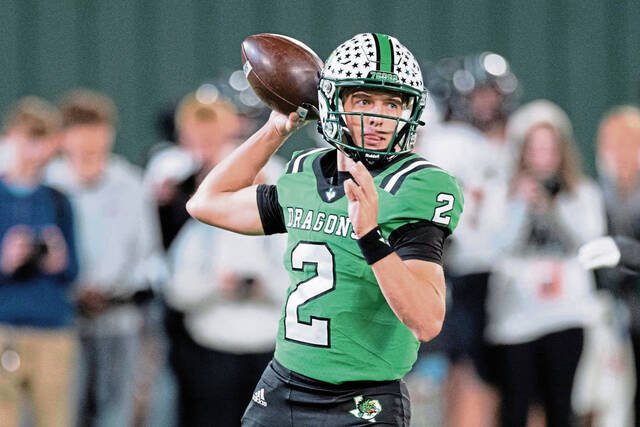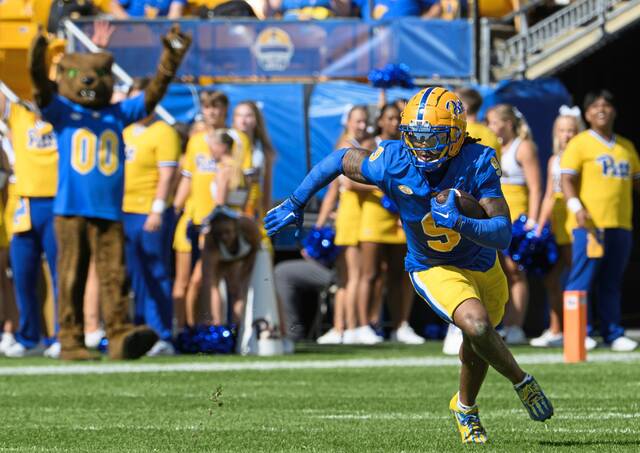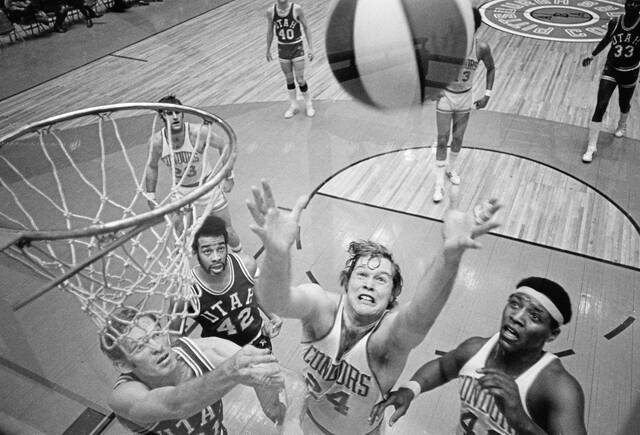The Italian Club has been active on Pitt’s campus for 106 years, but until the day Charlie Partridge walked Habakkuk Baldonado through the front door, it never was used as a recruiting tool for the football team.
Partridge, Pitt’s defensive line coach and assistant head coach, said it’s an experience he never will forget.
Partridge was ushering Baldonado around campus, hoping to get the big defensive end, who was born and raised in Rome, to sign with Pitt.
“We walked him into one of the buildings on campus, and the woman who runs the Italian Club (was there),” Partridge said. “She started to speak Italian to him.”
Suddenly, the visit was less about football and more about an 18-year-old thinking about moving 7,322 kilometers from home.
“He’s in that mode where he’s thinking in Italian and translating and speaking,” Partridge said. “To see him light up was pretty fun.”
Partridge should have shouted “Bellissimo.” In the context of football recruiting, it was, indeed, a beautiful moment.
But it was only one moment in the life of the 6-foot-5, 250-pound Baldonado, a redshirt freshman who will conclude his first full collegiate season Thursday when Pitt plays Eastern Michigan in the Quick Lane Bowl in Detroit.
Before he signed his letter of intent with Pitt and earned a prime role in Partridge’s rotation this season, Baldonado already had seen more of the world than most 20-year-old Italian football players.
Paola Franceschelli, the Mom in this story, saw to that, with an assist from Clearwater (Fla.) Academy International coach Jesse Chinchar, Baldonado’s innate curiosity and his dream of playing American football.
Franceschelli, who works for the United Nations Food and Agricultural Organization in Rome, always encouraged her sons, Habakkuk and his 18-year-old brother Jonathan, to travel and seek new experiences.
“I think the world is big and opportunities are wide,” said Franceschelli, who visited her son on Pitt’s campus over the Thanksgiving holiday. “The best thing for people is to go around and go where you can find something really meaningful in your life. I don’t think he will stop here.”
This isn’t the first time Baldonado has left home. He spent his senior year of high school at Clearwater in 2017, prepping for college.
It wasn’t easy for Franceschelli to let her eldest son move to the United States. Does she miss him? “A lot,” she said. “We are three.”
Franceschelli’s husband and the boys’ father, Edgar, died in a car accident seven years ago, she said.
“With (Habakkuk) away, it’s a different story, also for (Jonathan). Being the elder brother, he is a reference.”
But when Baldonado approached his mother with his plan to move to Clearwater, she encouraged him.
“I tried to see with him the pros and cons in relation to the school he was attending (in Rome),” she said. “(I said), ‘Let’s try it for six months, and then we shall decide what is the best way forward.’
“Myself, I left home when I was 18, thanks to my mum who was very supportive to me and my curiosity and my wish to know the world and to study and to understand more about cultures and languages.”
She studied in Paris and Edinburgh, Scotland, and speaks Italian, English, French and Spanish. Baldonado speaks English and Spanish, along with his native tongue.
“Mindful of that, I have always encouraged my children to travel and try to be as independent as they could and to think with their own head,” Franceschelli said. “Also, when they were younger, we traveled quite a bit. They have visited several countries, been exposed to different cultures because I believe diversity is a real wealth. It’s a real richness. It opens people’s minds and it helps fighting bad diseases like racism and intolerance.”
Buoyed by his mother’s support, Baldonado flourished at Clearwater, but he was not forgotten in Rome.
Shortly after Baldonado signed with the Panthers last year, Mike Kovak of Greensburg wore a Pitt shirt into La Botticella, a well-known Pittsburgh bar in Rome. The bar’s owner, Giovanni Poggi, who roots for the Steelers and Penn State, asked about Baldonado and said the Italians wish him the best.
At Clearwater, Baldonado had an elbow injury and missed four games, but he still recorded 30½ sacks and averaged 24.4 yards per reception as a wide receiver.
Chinchar didn’t have to take a trip to Italy to recruit Baldonado. “I wish,” he said, smiling.
Actually, one of Baldonado’s friends in Italy had attended Clearwater, which attracts students from all over the world, and helped him connect with Chinchar.
“He was raw, but you could tell the potential right away,” Chinchar said. “His athletic ability, his get-off, his motor — he had all the things you want in a defensive player.”
College recruiters were slow to hear about Baldonado, but when word of his senior season got around, the recruiting gates opened.
“In January, everybody came in to see him and the offers rolled in one after another after another,” Chinchar said. “At least in our area, he became the hottest name. If you were coming to Clearwater, you were coming to see Haba at Clearwater Academy.”
Partridge, the former coach at Florida Atlantic, had a friend in Florida who sent him video of Baldonado’s games.
He quickly dispatched linebackers coach and recruiting coordinator Rob Harley to Florida.
Serendipitously, Harley already was in Florida chasing another recruit.
Baldonado ended up choosing Pitt over offers from Michigan State, Oregon, Central Florida, Nebraska and many others.
“Pittsburgh appeared to me more of a European-style city with more culture, you can say, diversity,” Baldonado said. “One of the biggest things coach Harley told me, ‘We even have an international airport, so you can go and see your family more often.’ That was a really big thing.”
Said Partridge: “Some of the architecture (on campus) reminded him of home, and he felt like we could develop him.”
Initially, Baldonado wanted to major in engineering, but he switched to Economics with a 3.0 GPA this semester.
“To be honest, school in America is not that hard,” he said. “I am used to school in Italy. It’s way harder than here.”
College football never comes easy to young players, but Baldonado played an important backup role on Pitt’s 11th-ranked defense, registering 29 tackles, four sacks, 5½ tackles for a loss and a fumble recovery in 12 games.
Partridge tempered his expectations for Baldonado, but he said he developed “way faster than I ever could have expected.”
“If I’m being honest, it was probably just factoring everything in, American football in Italy, one year at a smaller, although successful, high school in Clearwater.
“You just figure he’s not going to be able to take to all the demands of Division I football (immediately). But this is where his God-given athletic ability, combined with his intelligence, has allowed him to progress faster.”
Brute strength and a competitive streak also helped. Baldonado once gave up football to concentrate on mixed martial arts, and he said he was pretty good at it.
But it’s his work ethic that has served him best at Pitt. During the season, Baldonado and his defensive line teammates had a competition to see who could reach Partridge’s classroom first in the morning. He said he woke up most days before 5:30 a.m.
He said it wasn’t a matter of memorizing what he was supposed to do on the field, but understanding why he was supposed to do it.
Said Partridge: “Some young men, when they really know the full understanding of why you’re doing what you’re doing, they can progress fast. That’s what Haba has been able to do.”
Meanwhile, Fransceschelli watches intently from a distance.
“For the moment, I am really happy for him because he is doing what he likes, what he loves,” she said. “He’s also studying. The only thing is the fact that we are far away (there is a six-hour time difference). Thank God, technology helps.”
She misses her first born but is at peace with his absence.
“There’s a saying that goes, ‘Give your children strong roots and good wings so they can fly away so they can also come back to you and be rooted.’
“When you know they are good at flying and that they will always come back to you, it’s not a problem.”
Get the latest news about Pitt football and all things Panthers athletics.


